Over the past few decades, tens of millions of responsible people have taken out life insurance policies, having understood the importance of this financial safeguard. Not only does the beneficiary receive a significant infusion of money upon the death of the insured person, but these policies are often very flexible as well, given that you can change the policy to meet the needs of the policyholder at any time. The policyholder has full control over the death benefit, which is often tax-deferred and free of estate tax. However, some people are rejected when they apply for life insurance, and here are the eight most common reasons why this happens:
1. Your Medical History Does Not Match Their Guidelines
As you may already know, every life insurance provider will carefully inspect the medical condition and history of each applicant prior to granting them coverage. Moreover, these insurance professionals also calculate the risk factors for developing certain illnesses or hereditary conditions based on the medical history of the applicant’s family members. If you have suffered from serious diseases or illnesses that may recur (such as cancer, which has a high risk of recurrence), then your provider may deny life insurance right away. Also, if your parents suffered from a disease and you have a genetic pre-disposition for developing it sooner or later, this may also be grounds for having your life insurance application rejected.
2. High-Risk Hobbies and Lifestyle
Your medical history is not the only thing that will be evaluated before a company grants you life insurance; your lifestyle and activities will be closely examined as well. For instance, if you work in high-risk environments with high chances of developing an occupational-related disease, or if you are passionate about dangerous adrenaline-stimulating sports such as bungee jumping or skydiving, then a life insurance provider can rightfully decline your insurance.




